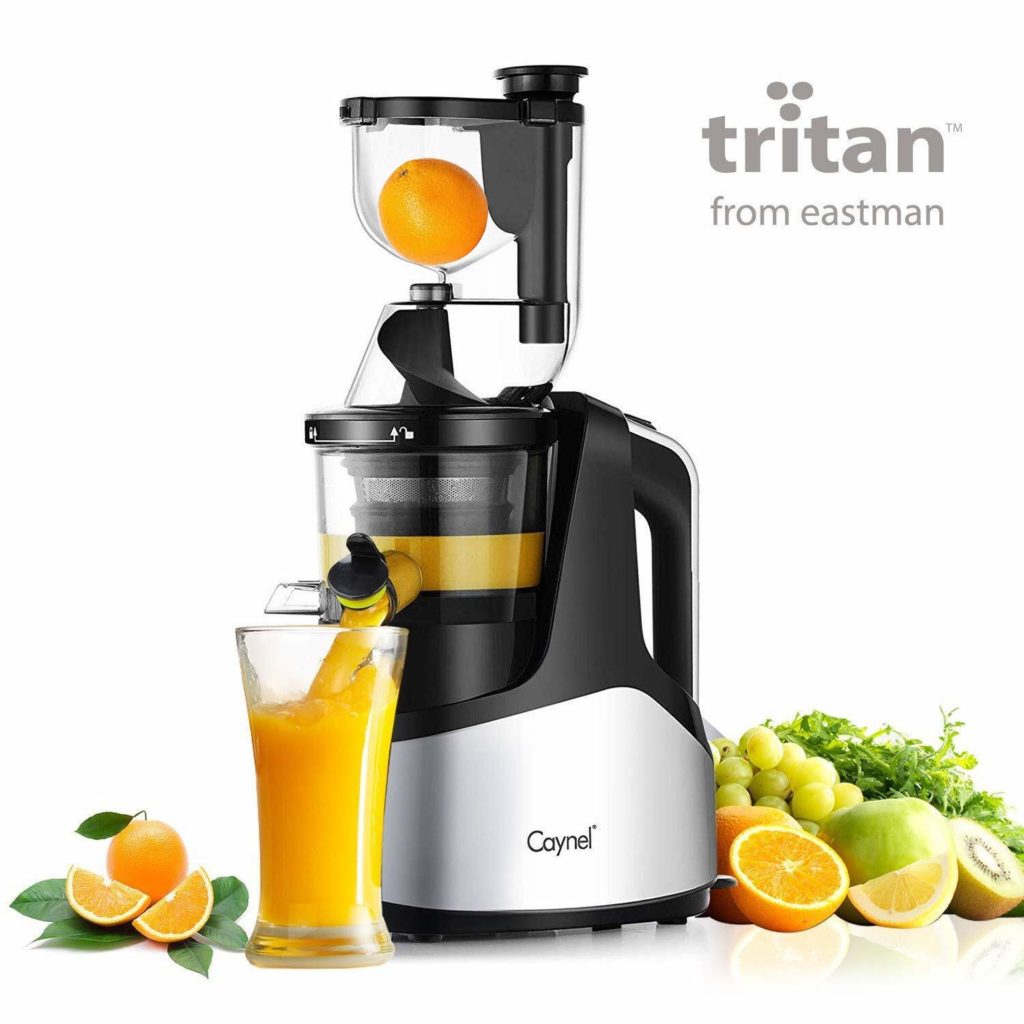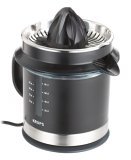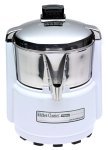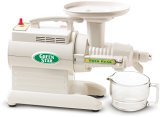
With a kitchen juicer you’ll be able to extract fresh juice from various fruits and vegetables, juice that will benefit your health greatly…
- it has a huge nutrient value.
- it is easy digested.
- you can control the amount of sugar in it.
Kinds of kitchen juicers
The juicers can be divided into two basic types…
- citrus juicers.
- juice extractors.
Some other devices, made especially for wheat grass and other hard treatable vegetables, are also available. However, it will be wiser if you select a general-purpose juice extractor that can process all kinds of fruit and vegetables.
1. Citrus juicers

These devices are designed only for citric fruits, such as oranges, lemons and grapefruits. They are cheaper than juice extractors and function by means of a ribbed cone, on which the inside part of half of fruit is crushed.
There are hand citrus juicers, for example in the form of a press, which will be activated by means of a handle, and electrical citrus juicers; some of them are just an attachment for a stand mixer.
Here are some of the qualities that make for a good citrus juicer…
- different-sized cones for extracting juice from fruits with different diameters.
- a strainer for adjusting the content percentage of fruit pulp in the juice. In general, juice containing more pulp is thicker and has more nutrients.
- a spout that you can use to pour the juice directly into a utensil. It is best if the spout is high enough to put tall glasses under it. The same also refers to the centrifugal juice extractors below.
2. Juice extractors
These devices have far more functions than citrus juicers; that’s why some of them cost more than $400. They can be divided into two basic types…
- centrifugal juice extractors.
- masticating juice extractors.
Centrifugal juice extractors

This kind of kitchen juicer is a good variant for preparing juice quickly. It cuts the product by means of a rotating blade and rotates the obtained pulp at high speed to extract the juice from it.
When choosing such a juicer, look for a model that ejects the produced pulp into a separate container. This will enable you to extract juice for a long time without having to stop to clean up; this is in contrast to juicers that gather the pulp in the same box where the food to be processed is cut. In addition, machines that have a separate container for pulp become unstable less often.
The disadvantage with centrifugal juice extractors is that you can’t use them for hard-treatable products, such as hard vegetables, leafy greens and fibrous vegetables. Further, rotating at high speed produces heat, which has a bad effect on the enzymes in the produce. The juice also becomes oxidized, which reduces the nutrient content.
Masticating juice extractors

These devices are usually more expensive than centrifugal juice extractors, but you can use them for a great variety of foods, including hard, leafy and fibrous vegetables. By adding different attachments to them, you can make pasta, nut foods, baby foods, frozen desserts, paste, sauces, etc.
These kitchen juicers grind the product until a pulp is obtained, and then press it in order to extract the maximum amount of juice from it. One strong advantage of this type of juice extractor is that the operating speed is slow, which prevents oxidation and avoids excessive heat. Thus, your juice will have more fiber, enzymes, vitamins and minerals. Some masticating juice extractors can even stabilize the juice, keeping it fresh for a longer time.
Factors to consider when selecting kitchen juicers
First decide what kind of juicer you need, then think about the following…
1. Guarantee: look for a juicer that will last for years. You will be able to use it every day without worrying about whether it will break down.
2. Ease of use: you have to work with your juicer with ease, because otherwise you will not use it. It has to be…
- comparatively easy to lift and carry.
- if the device is electrical, it should not vibrate much and must be comparatively silent during operation. Kitchen juicers that spin at high speed, such as centrifugal ones, tend to vibrate and be noisy.
- it is a good idea if the electrical juicer can spin in reverse, in case it clogs with pulp.
3. Easy to clean: your juicer should be easy to clean after use. It will be wonderful if it has easily removable component parts, which can be cleaned individually in a dishwasher.
4. Power: the power of the machine affects the variety of foods that you will be able to process. A powerful motor (one with high wattage) will not slow down even when processing harder foods; therefore the risk of damage is smaller.
5. The amount of prepared juice: with a quality juicer you will extract a greater amount of juice from the produce. With a cheap juicer you will need to buy more produce to obtain the same amount of juice extracted with an expensive juicer, and so it will cost you more over time.
6. The size of the juicer: the juice extractor takes up space, but it will be good if you can leave it on the countertop for ease of use.
7. The feed tube size: the wider the chute where you will place the produce, the less labor and time you will need to spend in preparing it.
Some juice extractors have an extra, wider feed tube, to put large items of produce such as apples and tomatoes, without chopping them into tiny pieces.
8. Availability of spare parts.
9. A place for the cable.
The popular names for juicers are Breville, Champion, Cuisinart, Hamilton Beach, Jack LaLanne, Omega and Waring. Some juicers may come with a recipe booklet that gives you some ideas of the various ways they can be used. Click here for the best deals on kitchen juicers.
#CommissionsEarned
Love juice! Very nice advices, here I sent you my feedback.
Greetings.
Great material and very informative. We’ve seen a lot of information sites on juicing but yours is right on. Keep up the good work!
Thank you for your comment, Jason.
Regards,
Ganka
Juicers are a necessity at our house. Without them my kids would never receive a daily intake of nutrients from fruit without them.
Very valuable health information, great blog post. Thanks.
I suppose you could put peeled oranges, etc. in a regular juicer, but it certainly would be a lot of trouble to peel them before putting in the juicer. This is why a citrus juicer is a good idea.
Cool staff and good advice to all people that enjoy drinking fresh juices each day.
Thanks for the post. I didn’t know you get two kinds of juicers. Never too old to learn.
Thanks for the great info. You sure do know a lot about juicers.
Wonderful information on kitchen juicers! It is so accurate… I think it is one of the best out there as it has helped me a lot!
Great read.
I think what stands out most to me is that we may think we’re making a saving by getting a cheaper juicer brand but end up spending more on the produce in the long run.
I’m currently saving up for a good juicer that will last the long haul.
Thanks for the tips.